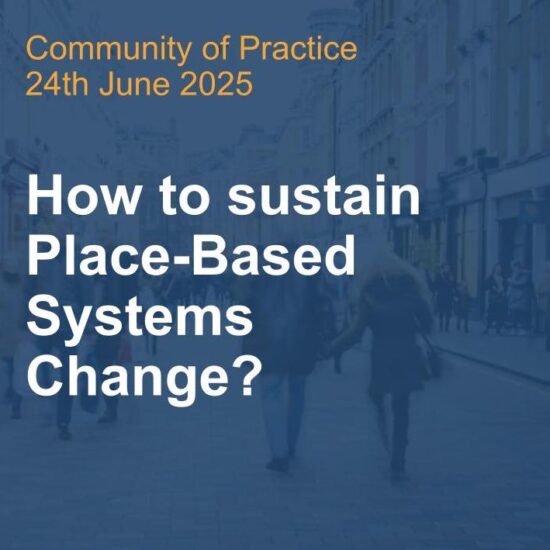What does sustainability mean to you?
Insights from Renaisi's inquiry into sustaining place-based systems change
On the afternoon of our annual in-person meeting of the Place-based Systems Change Community of Practice we began exploring the question that will be the focus of an intensive inquiry for Renaisi over the next six months: What does it mean to sustain place-based systems change?
What to avoid?
To begin fleshing out this question, we first asked community members to brainstorm ideas for how they would make a place-based systems change initiative as unsustainable as possible. They shared that a deeply unsustainable initiative would be:
- Designed from the top-down with no community involvement.
- Overly driven by quantitative targets
- Led by a group that is not diverse or inclusive of a range of experiences, identities and perspectives.
- Delivered by those unfamiliar with the local context and without time devoted to building trust with local partners and community members.
Does that remind you of any initiatives you’ve seen come and go?
What to look for?
From here we moved into brainstorming a definition for “sustainability” in place-based systems change work. Beautifully articulated by a community member as the “scaffolding that keeps growing’, the Community of Practice viewed sustainability in place-based systems change work as…
- Sustainability as a dynamic, long-term way of working. It is an ongoing process, rather than an end state that one reaches at the completion of a project.
Under this definition, sustainable place-based systems change initiatives will be guided by a long-term vision and be flexible about how this is progressed over time, rather than aim at set outcomes that will be delivered in defined timelines. This definition sees sustainability as an approach and practice that is rooted in ongoing experimentation to understand what works locally and why. The group felt that building the capacity and mindsets to use failure as a way to lean and adapt was critical to sustainability in place-based systems change work.
- Sustainability as the development of long-term relationships that root the initiative in the place. It emerges with a depth and breadth of engagement and collaboration across the place, with all parts of the system.
Under this definition a sustainable place-based systems change initiative will be co-owned by anchor organisations that have a long-term commitment to the place, and engage grassroots organisations and formal powerholders across sectors at all levels of the system. It will also require strong, inclusive governance that allows for expanding and dynamic partnerships, while being founded on ashared vision for and understanding of systems change in the place. The community highlighted that this is why place-based systems change initiatives have to devote time to support the growth of trusting relationships, especially with the community and those that have been marginalised from local decision-making.
- Sustainability as secure, long-term resourcing for work that is relational, locally rooted, and dynamic. In other words, this is long-term resourcing that allows and supports the ways of working articulated in the definitions above. We know that relational, locally rooted, dynamic practice that shifts power and narratives is critical to place-based systems change work. Across our previous inquiries in 2022 and 2023 and the development of our evaluation tools we’ve examined these elements of systems change. We believe there is a wealth of evidence pointing to the importance of these elements in sustaining place-based systems change.
As a result of this, our inquiry will be primarily focusing on that third articulation of sustainability, the long-term resourcing of place-based systems change work, and how it can be done in a way that supports the type of practice we already know to be place-based and systemic.
Where we go from here?
With a room that brought together national charities, place-based charities, philanthropic funders, local authorities, infrastructure bodies, housing associations and researchers, the discussion showed how important this question is to a huge range of those interested in place-based systems change work.
The discussion showed that sustainability isn’t all about funding – but funding has to be part of the picture. This funding must be long-term and unrestricted – to enable the ways of working that are equally critical to sustainability.
People are also interested in how data collection and community engagement work can be designed to bring sustainability – by supporting relationship development, ongoing learning and shifts in power.
The sector wants to understand more about financial models for place-based systems change that go beyond philanthropic and public funding. We are interested in exploring how different approaches to long-term resource, such as blended finance and community ownership, can enable sustainability alongside exploring how philanthropic and public sector funding can shift to ensure its money delivers more sustainable impact.
We’ve carried forward the advice and insights that the Community of Practice members shared with us into the development of a set of focus areas for our inquiry into sustainability. If you would like to check these out or learn more about how to get involved going forward, check out this page.

- Contact Kezia del Carmen (formely Jackson-Harman) on:
- 2045244916
- k.jackson-harman@renaisi.com

- Contact Beth Stout on:
- 020 7033 2651
- b.stout@renaisi.com



